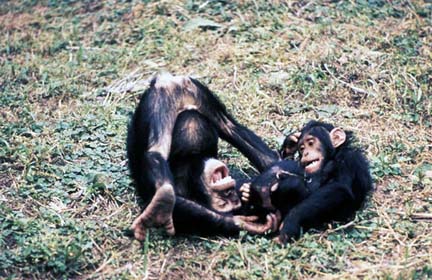Play

Freud and Frodo playing – Credit Jane Goodall
Like humans, childhood
is a time for learning. Chimpanzees are also dependent on
learned behavior in almost every aspect of their adult
lives. The social skills needed as an adult are obtained
during childhood from observing and participating in
social behavior.
Play is an important
activity for young chimpanzees. They learn to move about
quickly in the trees and to run through the rugged
underbrush of the forest playing "chase". They
will use this skill as an adult to evade aggressors. Games
like wrestle/tickle/poke and play biting are rudimentary
behavior that becomes violent when adults fight.
Watching chimpanzee
children play is like watching human youngsters. They love
rough and tumble play such as wrestling, chasing about on
the ground and in the tall trees, poking and tickling with
long fingers, and crazily turning pirouettes and
somersaults on the ground and wild gymnastic play among
the branches of the tall forest canopy.
Young chimpanzees must
pay attention to their mothers and other adults to learn
which foods are safe to eat and where ripe food is
located. Some foods require tools to obtain while other
foods are obtained through hunting. These skills are
observed and first attempted as children. Making tools and
using them to obtain food and hunting are also human
behaviors.
Captive Chimpanzees
One of the most
enjoyable experiences a visitor remembers from a zoo
experience is watching the incredible gymnastic skill and
daring of young chimpanzees. To encourage the proper
development of muscle and motor skills and to keep adults
physically fit and mentally stimulated, zoos put climbing
poles, ropes, towers, hammocks of rope or plastic, and
various other objects in the enclosure and night quarters.
The chimpanzees frequently invent new acrobatic uses for
these objects that delight zoo visitors. Adult
chimpanzees, especially large adult males, display a great
deal of patience and interest in these pesky youngsters
wanting to play games, like wrestle, tickle and poke. They
engage the youngsters in wild bouts of chase high up in
tall enclosures, jumping and climbing wildly from
structure to structure while grinning with joy.

